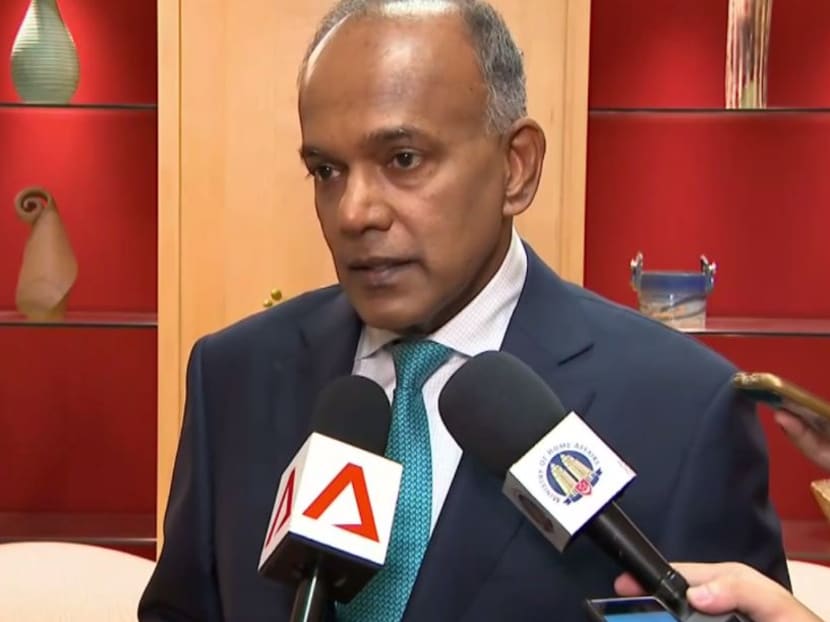Muis should be praised for revoking accreditation of ex-religious teacher: Shanmugam
SINGAPORE — Home Affairs and Law Minister K Shanmugam said that the Islamic Religious Council of Singapore (Muis) should be commended for revoking a religious teacher's accreditation after it learnt about his misguided teachings.

Home Affairs Minister K Shanmugam revealed that Muis has previously revoked the accreditation of other religious teachers under its scheme, but did not elaborate.
SINGAPORE — Home Affairs and Law Minister K Shanmugam said that the Islamic Religious Council of Singapore (Muis) should be commended for revoking a religious teacher's accreditation after it learnt about his misguided teachings.
He was speaking to reporters on Wednesday (Jan 16) after the Ministry of Home Affairs (MHA) announced that Murad Mohd Said, 46, was issued a Restriction Order under the Internal Security Act — the first time that an accredited religious teacher is placed under the order for spreading extremist ideas.
Murad's student Razali Abas, 56, was issued the same order.
Murad was accredited under the Asatizah Recognition Scheme (ARS), which recognises teachers and scholars who meet the minimum standards of qualification to preach and teach Islamic religious knowledge. The scheme, which has been voluntary since 2005, was made mandatory for all asatizah (religious teachers) from January 2017.
Responding to concerns about the accreditation process of the scheme — which is meant to prevent the spread of radicalised teachings — Mr Shanmugam pointed out that it is “entirely possible for people to espouse a certain set of religious beliefs, and then over time add to those teachings or change those teachings”.
He said: “So based on whatever (information) Muis had at that time, and I don’t know what information they had, they thought that he could be accredited, but when they came to find that his teachings were not appropriate, they did revoke him.”
Responding to TODAY’s queries, Muis said that Murad was accredited when the scheme was still voluntary. Razali began attending Murad's classes in 2012.
However, Muis did not say when it found out that Murad was spreading misguided teachings. Muis cancelled Murad’s accreditation in May last year. However, he continued spreading his “segregationist views” online, the MHA said.
Mr Shanmugam revealed that Muis has previously revoked the accreditation of other religious teachers under the scheme as well, but did not elaborate. He added: “Muis ought to be commended… you have a system of certification, it works well by and large, and when somebody is… (straying from the appropriate teachings) and his teachings are inimical to society, Muis have taken action.”
On Murad, Mr Shanmugam noted that his accreditation was revoked “when his teachings became deviant and not acceptable and contrary to the values of our society”. The authorities then acted when he “became a threat to national security”.
Mr Shanmugam stressed: “We go on the basis of facts, doesn’t matter who you are. If you advocate violence, you preach violence, we will act against you.”
Dr Nazirudin Mohd Nasir, Muis’ senior director of religious policy and development, reiterated that people should always seek guidance and teachings only from credible religious teachers and schools under the ARS, which “has robust mechanisms in place to preserve and protect the religious life of the community”.
Muis said that there are about 4,400 religious teachers under the ARS. It added that freelance asatizah can be engaged by organisations, groups or individuals to conduct religious classes or talks. They can also hold classes for small groups at home, for example.
In 2010, Muhammad Anwar Jailani, an unaccredited religious teacher, was issued a two-year Restriction Order, along with his student Muhammad Thahir Shaik Dawood.
In a Facebook post, Minister-in-charge of Muslim Affairs Masagos Zulkifli noted that Murad did not change his ways, even though Muis and the Asatizah Recognition Board spoke to him after he came to the council’s attention.
He “persisted in his harmful teachings” after he was struck off the scheme’s register and not allowed to conduct classes in Singapore, Mr Masagos added.
Ms Grace Fu, Minister for Culture, Community and Youth, also weighed in on Facebook, stressing that the latest cases “underscore the continued need for vigilance”. “Murad and Razali do not represent our Muslim community, and we must continue to stand together with our Muslim friends,” she said. ADDITIONAL REPORTING BY FARIS MOKHTAR AND NEO RONG WEI











